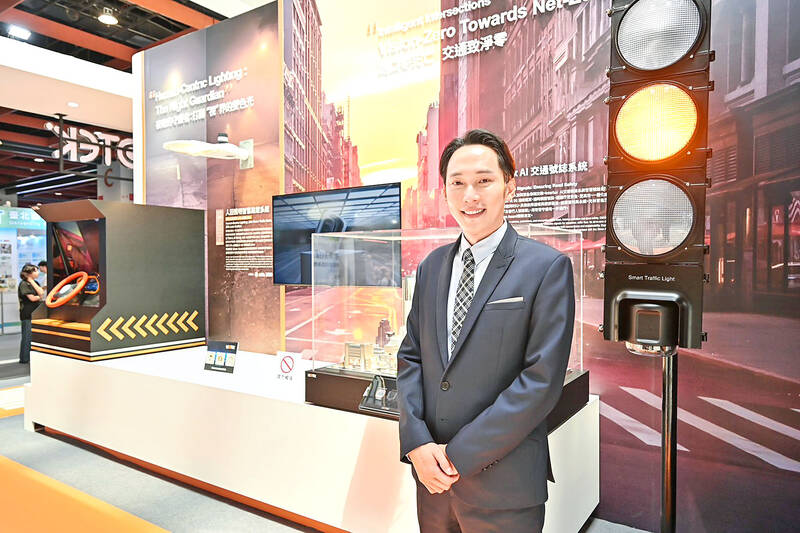Leotek Corp (光林智能), a lighting and traffic signaling equipment subsidiary of Lite-On Technology Corp (光寶科技), expects revenue this year to surpass last year’s, driven by infrastructure project gains in Taiwan, North America and elsewhere, company president Torrent Chin (金海濤) said yesterday.
Orders for street lighting fixtures and traffic signaling equipment in Taiwan, and in the US, Canada, Mexico and Chile, as well as for products used in parks, campuses and parking lots in Australia, New Zealand, China and Spain are expected to increase, Chin said on the sidelines of an exhibition in Taipei.
The company has received several orders for electric vehicle (EV) charging piles this quarter from the public and private sectors, he said.

Photo courtesy of Leotek Corp
The company last year acquired UK-based industrial LED solutions provider Dialight PLC, which mainly operates in the US and Mexico.
The deal has strengthened Leotek’s presence in the North American market, helping it secure more US orders this year. Its street lighting and traffic signaling solutions are now widely adopted in major US cities, including New York, San Francisco, Los Angeles, Dallas and Chicago, Chin said.
He did not provide an exact figure for the company’s projected revenue for this year, saying only that revenue in the first half was expected to outpace the second half at a 55 to 45 percent split, with the result depending on government bids and budgets, which vary from year to year.
Leotek operates plants in Taoyuan’s Longtan District (龍潭) and in San Jose, California, with each site accounting for 50 percent of the company’s total output, he said.
Most shipments to US customers are made through its US plant, while shipments to other countries are handled through its Taiwanese plant, he said.
As tariffs have affected some supply chain material costs, the company raised product prices last quarter, he added.
Orders are likely to remain stable going forward as local governments in Taiwan continue infrastructure renewal, while their counterparts in the US expand in smart transportation, EV charging and safety sensing, Chin said.
However, orders next quarter might be flat sequentially, as the US enters the holiday season and it is traditionally off-season for the company, he said.

NEW IDENTITY: Known for its software, India has expanded into hardware, with its semiconductor industry growing from US$38bn in 2023 to US$45bn to US$50bn India on Saturday inaugurated its first semiconductor assembly and test facility, a milestone in the government’s push to reduce dependence on foreign chipmakers and stake a claim in a sector dominated by China. Indian Prime Minister Narendra Modi opened US firm Micron Technology Inc’s semiconductor assembly, test and packaging unit in his home state of Gujarat, hailing the “dawn of a new era” for India’s technology ambitions. “When young Indians look back in the future, they will see this decade as the turning point in our tech future,” Modi told the event, which was broadcast on his YouTube channel. The plant would convert

‘SEISMIC SHIFT’: The researcher forecast there would be about 1.1 billion mobile shipments this year, down from 1.26 billion the prior year and erasing years of gains The global smartphone market is expected to contract 12.9 percent this year due to the unprecedented memorychip shortage, marking “a crisis like no other,” researcher International Data Corp (IDC) said. The new forecast, a dramatic revision down from earlier estimates, gives the latest accounting of the ongoing memory crunch that is affecting every corner of the electronics industry. The demand for advanced memory to power artificial intelligence (AI) tasks has drained global supply until well into next year and jeopardizes the business model of many smartphone makers. IDC forecast about 1.1 billion mobile shipments this year, down from 1.26 billion the prior

People stand in a Pokemon store in Tokyo on Thursday. One of the world highest-grossing franchises is celebrated its 30th anniversary yesterday.

Zimbabwe’s ban on raw lithium exports is forcing Chinese miners to rethink their strategy, speeding up plans to process the metal locally instead of shipping it to China’s vast rechargeable battery industry. The country is Africa’s largest lithium producer and has one of the world’s largest reserves, according to the US Geological Survey (USGS). Zimbabwe already banned the export of lithium ore in 2022 and last year announced it would halt exports of lithium concentrates from January next year. However, on Wednesday it imposed the ban with immediate effect, leaving unclear what the lithium mining sector would do in the